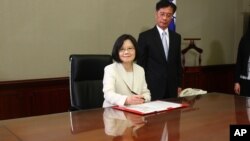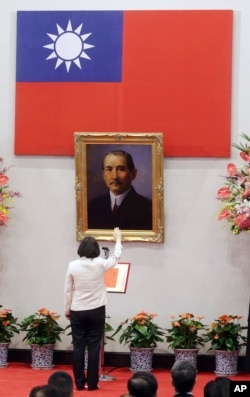A slap from China at new Taiwanese President Tsai Ing-wen’s status as a single woman exposes a divide in how two ethnic Chinese societies, which are already at odds politically, see gender and leadership amid different development pressures.
People in mainland China often believe that women, while acceptable in the workforce, should strive foremost for marriage and make family prosperity their top goal. Confucian values dating back 2,500 years enshrine those ideas, which have reemerged since around 2000 with the waning of China’s old Communist revolutionary fervor that advocated gender equality.
On the mainland today, single women over the age of 30 are often referred to as “leftover women.”
In Taiwan, which is 98 percent ethnic Chinese, marriage remains an ideal, but women increasingly shun it to pursue careers, income and freedom from family obligations that may include taking care of a husband’s parents plus their own children.
China already dislikes Tsai for rejecting its call for dialogue, on the condition both see themselves as part of China. Taiwan and China have been political rivals since the 1940s. The two Asian neighbors are self-ruled, but China claims sovereignty over Taiwan and insists that it be brought under its control as a conclusion to the Chinese civil war of the 1940s. Surveys show that most Taiwanese prefer today’s degree of autonomy.
China’s official Xinhua News Agency ran a commentary on Tuesday saying, “as a single female politician, [Tsai] lacks the emotional encumbrance of love, the constraints of family or the worries of children.”
Wang Weixing, an analyst with the People's Liberation Army and a board member of the semiofficial body in charge of dialogue with Taiwan, wrote the piece.
Tsai focuses too much on details and short-term goals, not broader strategic matters, the Xinhua piece added. “Her style and strategy in pursuing politics constantly skew toward the emotional, personal and extreme,” it said.
Xinhua has removed the article, but other Chinese media were carrying it later in the week.
But few Taiwanese remarked publicly on the 59-year-old law scholar’s gender or marital status as she campaigned last year for president against two men. She won by a landslide in January and took office May 20 as Taiwan’s first female president.
“The people of China need to understand that this is now the 21st Century,” said Raymond Wu, managing director of the political risk consultancy e-telligence in Taipei. “Some of these things do not carry any weight let alone credibility with the people of Taiwan. Something like this is counterproductive to the stability of cross-Strait relations and this is almost personal.”
Joanna Lei, a female former legislator and chief executive officer of the Chunghua 21st Century think tank in Taiwan, calls the piece a personal attack that reveals gender bias in Beijing.
“This is a backhanded way to launch a personal challenge to Tsai Ing-wen,” Lei said. “However, it is very clear that when male politicians are not subject to the same of criticism, female politicians should be subject to such criticism either.
“I simply think that Taiwan has a high level of female participation in politics, so there might be a difference in terms of experience for the standards applied to female versus male politicians,” she said.
For China, she added, “I think as the country gradually moved into its current political arena, the old sort of Chinese heritage and baggage came into play.”
Childbirth in Taiwan declined to less than one baby per woman in 2011, alarming the island government about long-term labor productivity. But women in other relatively affluent parts of Asia, such as ethnic Chinese Hong Kong and Singapore, are also passing up childbirth to build careers.
By contrast, in China 46 percent of people lived in rural areas as of 2014, according to World Bank data. Those often lived on farms and near the poverty line. Those conditions enforce traditional gender roles as men focus on hard agricultural labor and women run households.
Taiwanese prize women who balance family and career, including politics, said Chen Ying, a female ruling party legislator of eight years. “Just about all women, due to their work, find it hard to pay attention to both, so voters will feel sympathy on this matter because we invest a lot of time in our work,” Chen said.
Some voters even prefer female politicians because of the perception they understand better than men the issues faced by families, she added.
Few women get top jobs in China’s ruling Communist Party. A modern-day standard bearer of female politicians was Wu Yi, a Politburo member popularly dubbed the “iron lady” for her negotiation skills. But she retired in 2008.
The presidential office in Taiwan declined comment Friday on the Xinhua commentary.
But her government responded quickly to a rash of stern political remarks from China over the past week. Beijing’s government has warned against any push in Taiwan for legal independence and questioned whether Tsai wants talks with Beijing.
Tsai rejects the “one-China” dialogue precondition, which underscored overall upbeat talks between Beijing and her predecessor Ma Ying-jeou since 2008. She has voiced support for talks under Taiwanese laws, if the island’s public approves.









